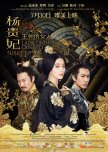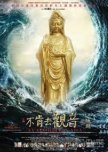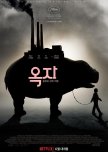 WCCS: Fantasy or Alternate Past Titles from Japan
WCCS: Fantasy or Alternate Past Titles from Japan Japanese Buddhist monk Kukai is sent to the Tang dynasty in China to learn about its culture and civilization. He affirms his determination to learn everything about Vajrayana, but then a demon cat appears and breaks the peace of Chang’an City, causing a series of strange events (powerful men in the capital die continuously). So Kukai joins hands with poet Bai Le Tian to investigate the death of Concubine Yang, by following the trail left by the cat, unveiling a buried fact. ~~ Adapted from the novel "Samon Kukai Tou no Kuni nite Oni to Utagesu" (沙門空海唐の国にて鬼と宴す) by Yumemakura Baku (夢枕獏). Edit Translation
- English
- 中文(台灣)
- Polski
- magyar / magyar nyelv
- Native Title: 妖猫传
- Also Known As: Kukai , Kukai―KU-KAI― , Demon Cat , Legend of the Cat Demon , Yao Mao Zhuan , Sha Men Kong Hai , 空海―KU-KAI―
- Director: Chen Kai Ge
- Genres: Thriller, Historical, Mystery, Fantasy
Cast & Credits
- Huang Xuan Main Role
- Sometani ShotaKukaiMain Role
- Sandrine PinnaYang Guifei/ Empress YangSupport Role
- Liu Hao RanBai Long / "White Crane"Support Role
- Qin HaoChen Yun Qiao / Chen Xuan LiSupport Role
- Zhang Yu QiChun QinSupport Role
Reviews
Huang Xuan and and Japanese actor Shota Sometani star as the leads - but really they are merely tools for the narration of this story, which honestly kind of took me out of the core story at times. I get that the original novel used this element as well, but I do think it felt a little extra at times - that we were sacrificing the meat of the story to give the two stars more screentime. Huang Xuan plays Tang dynasty poet Bai Juyi, and it was kind of a weird performance from him. I think part of that is the director's fault, but the character was just a bit all over the place. Shota Sometani's Kukai was much better, and he gave a pretty good performance as the somewhat mysterious monk (yes, all the Japanese actors have their voices dubbed - though they do have some lines where they speak Japanese). The two pair up to find out why a demon cat has been haunting the capital.
The real story revolves around the famous (or infamous, depending on who you ask) Yang Guifei, the imperial consort of the Emperor Xuanzong - and the circumstances surrounding her death. This is the part of the story where it becomes purely fictional and speculative - but it was definitely the most interesting part of the film. I don't know where I read this, but apparently in the novel, the author had described her being of mixed blood, so the casting of Sandrine Pinna makes a little bit more sense (as you can imagine, mainland audiences were not impressed by a Taiwanese/French Yang Guifei).
Sandrine is gorgeous in her role (seriously, she looks absolutely stunning in ancient costume) and had a dignity and loneliness to her that suited the character well - the only thing that kind of throws you off is that Yang Guifei has been known historically as having a very voluptuous figure (Sandrine is on the slender side). Yang Guifei is so famous for this in China that it has become part of her characterization - and it was more noticeable because actress Kitty Zhang, who plays another character in the film, does have that kind of figure. I imagine they wanted Sandrine more for her face and overall presence so it's not a huge deal - just an interesting note.
I would have liked to seen more of Zhang Luyi's Emperor Xuanzong and gotten a glimpse of what exactly he was thinking throughout the film, but I guess it doesn't really matter in the grand scheme of things. The love that they had for each other could have also done better - I think I got a pretty good hint of what their relationship looked like, but I do think it could have been explored more since it was such a crucial part of the story. Hiroshi Abe's character was also an interesting foil to the Emperor.
Liu Haoran and Ou Hao are the two youngsters in the cast and let's just say I was quite surprised by their importance to the story, especially Liu Haoran's Bai Long. I've seen the BTS clips of the way they're styled for the film and wasn't sure how I felt about it, but it's pretty stunning once you see them in motion. Liu Haoran famously lost 20 pounds for the role after Chen Kaige looked at him and said he was a little too chubby (which I think is ridiculous because the boy is already built like a stick), but it worked well for the role visually. The two's characters also added a dimension to the story that I wasn't expecting, but welcomed as it actually made the story come alive for me.
I think I've used the word "visually" probably at least six times already - and that kind of goes to show where most of the thought went into for this film. The core storyline was interesting, but screentime was limited - Huang Xuan and Shota Sometani probably had triple the amount of appearances than anyone else. Considering that they aren't directly involved, it just slows the pace down significantly and makes the transitions seem a bit choppy (it also disturbs your emotional attachment to the characters). But if you cast stars, you've got to give them screentime, right?
This was an ambitious attempt by the director, and the film covered a wild variety of themes and motifs, but probably bit off more than they could chew. Still, I enjoyed it for what it was a - a treat for the eyes and an explorative look at a well known story and characters.
Was this review helpful to you?

Are there limits to an emperor's power or simply limits to an emperor's love?
A black cat slithers sinisterly through the households of Changán's elite seeking out its favorite meal of fish eyeballs; a series of eerie inexplicable events in its wake. When it dares torment Emperor Xuanzong, palace official and aspiring poet Bai Letian (Bai Juyi) and visiting Japanese monk Kukai pair up to track down and exorcise the demon cat. These two historical figures must uncover the cause of the cat's resentment in this wildly speculative account of the inspiration behind the most renown Tang poem in history 長恨歌/Chang Hen Ge/The Song of Everlasting Regret or Sorrow.Yang Yuhuan (Yang Guifei or Precious Consort Yang) is a cultural legend that stirred the imaginations of artists, poets and writers for centuries. One of the Four Beauties of Ancient China, she was the femme fatale that distracted a great Tang emperor from affairs of state and sent the empire into decline. In this opulent blockbuster, Chen Kaige conjures the fantastical sensuous decadence of the Tang empire at its zenith and the subtle decay of its decline. While Sandrine Pinna hardly leaps to mind,, she passes muster as this famous, captivating beauty that toppled an empire. I cannot rave enough about how masterfully this production evokes the famous poem, with its vivid, erotic imagery of an incomparable beauty, an intoxicating and toxic love story and the haunting intensity of eternal regret and sorrow. Are there limits to an emperor's power or simply limits to an emperor's love?
Where the movie falters is in the narration. Both the role of Bai Letian and that of Kukai are miscast and not well written. The movie dwells too much on Kukai's backstory, which is not interesting and peripheral to the plot. There is zero chemistry between Huang Xuan and Sometani Shota and neither actor conveys why their character is compelled to solve the mystery of this enigmatic and very spooky cat. In fact it is Liu Haoran and to a lesser extent Ou Hao's White Crane and Red Crane that resonate and absolutely steal the show. Liu Haoran's portrayal of youthful infatuation, betrayal, the terrible burden of holding a lasting grudge and the release of letting go leaves the strongest impression among all the performances. If the two lead roles were better written and articulated, I would easily rate this better than 9,0 instead of 8.5. Nonetheless this is one of the best ancient fantasy thriller mysteries I have watched in a long time.
Was this review helpful to you?

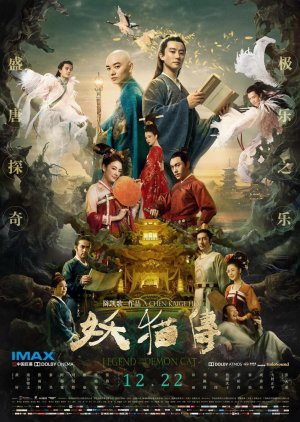










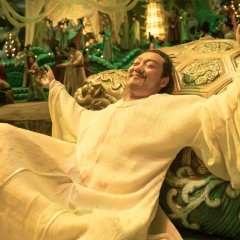
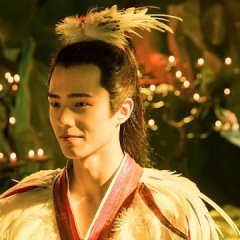
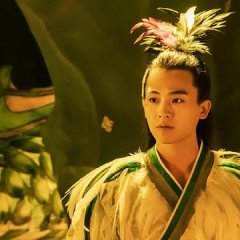
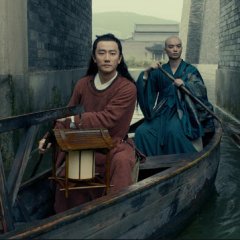
 2
2
